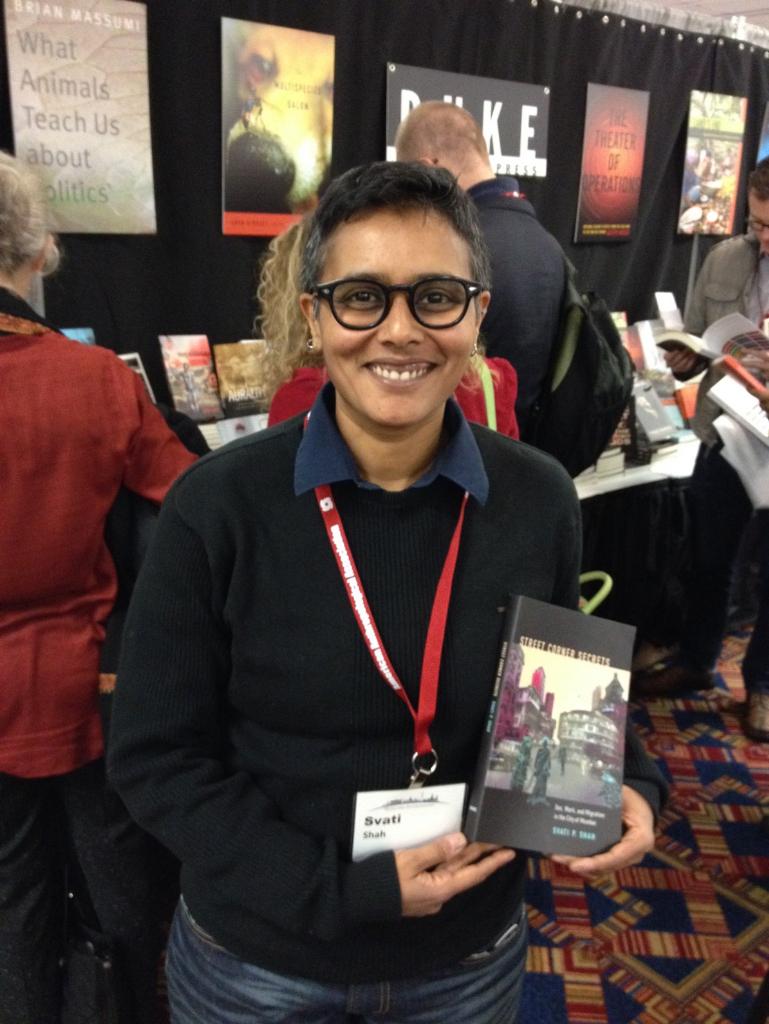The Blog
Warning: Use of undefined constant yarpp_related - assumed 'yarpp_related' (this will throw an Error in a future version of PHP) in /home/bu1lq82sfmnc/domains/traffickingroundtable.org/html/wp-content/plugins/related-posts-slider/related-posts-slider.php on line 171
Warning: Use of undefined constant yarpp_related - assumed 'yarpp_related' (this will throw an Error in a future version of PHP) in /home/bu1lq82sfmnc/domains/traffickingroundtable.org/html/wp-content/plugins/related-posts-slider/related-posts-slider.php on line 295
Sex Work & Women’s Movements (in India & U.S.)
CREA, a feminist human rights organization based in India, published a paper by Svati P. Shah that examines key issues in the relationship between sex workers’ and women’s movements, using the United States and India as its examples. The paper explores the history of women’s movements and sex workers’ movements, as well as whether and how they intersect. It goes on to discuss the contemporary context, including the status of alliances and dialogue between women’s movements and sex workers’ movements, the ways that HIV/AIDS have structured this relationship, and the question of agency.
Street Corner Secrets: Sex, Work, and Migration in the City of Mumbai


Study of Thailand’s Recent Efforts to Counter Human Trafficking
On June 30, 2016, John Hopkins Bloomberg School of Public Health (JHSPH) released a study detailing Thailand’s initiatives to counter human trafficking over the past five years. The report, supported by a research grant from the Royal Thai Embassy in Washington, DC, contains a review of documents and interviews with experts in the field of trafficking prevention, as well as an assessment of the methodologies of the U.S. Department of State’s Office to Monitor and Combat Trafficking in Persons (TIP Office).
In summary, JHSPH found that there is significant disagreement between stakeholders surrounding what Thailand has accomplished in their efforts to counter human trafficking, and JHSPH concludes that the disagreements are both the cause, and the result of, great mistrust between public and private stakeholders. Additionally, there is also a dispute regarding whether or not the TIP Reports utilize reliable assessment measures and ranking criteria.
Click here to read the full report.
Call for Papers: Where’s the Evidence? The Anti-Trafficking Review (Deadline for Submission: July 1, 2016)
Call for Papers: Where’s the Evidence? The Anti-Trafficking Review (Deadline for Submission: July 1, 2016)
Responses to, and international interest in, human trafficking have proceeded apace over the past 15 years in line with the adoption of the UN Trafficking Protocol. Yet, a great deal of anti-trafficking work is based on assumptions that are not well-proven and infrequently questioned. Why, for example, do some regions or groups emerge as trafficking hot-spots to become ‘intervention intensive’? How do anti-trafficking actors justify and explain the need to continue work in a particular area, or with a particular group? Similarly, anti-trafficking measures often continue in the absence of efforts to monitor and evaluate their effectiveness. How, in these circumstances, can the value of anti-trafficking work be estimated? On what basis is funding continued or denied to organisations undertaking such interventions? There has been some critical reflection on these issues, with a number of critical commentators questioning the production, global circulation and validity of statistics on human trafficking in particular. Statistics often take on a life of their own, despite their often questionable genesis, whilst the place and value of qualitative approaches in the field is also open to some scrutiny. Qualitative research methods are not necessarily any more robust in this relatively young field, and critics have questioned unethical and sometimes directly harmful methods of both qualitative and quantitative data collection and analysis. This special issue builds on such work, to critically explore the question of evidence in both the characterisation of human trafficking and in evaluating the merit of anti-trafficking work.Special Issue to be published in April 2017. Those interested in submitting to follow the Review’s style guide and submission procedures, available at www.antitraffickingreview.org. Manuscripts should be submitted in line with the issue’s theme.
Anti-Trafficking Review – New Issue and Call for Papers
Anti-Trafficking Review No.5 (2015): Forced Labour and Human Trafficking
Human trafficking is now associated, and sometimes used interchangeably, with slavery and forced labour. As this issue highlights, this shift in how we use these terms has real consequences in terms of legal and policy responses to exploitation. Authors – both academics and practitioners – review how the global community is addressing forced labour and trafficking. In 2014 governments across the globe committed to combat forced labour through a new international agreement, the ILO Forced Labour Protocol. Assessing recent efforts and discourse, the thematic issue looks at unionsstruggling to champion the protection of migrants’ labour rights, and at governments fighting legal battles with corporations over enactment of supply chain disclosure laws. At the same time, authors show how regressive policies, such as the Kafala system of ‘tied’ visas for lower paid workers, are eroding these rights. This issue features short debate pieces which respond to the question: Should we distinguish between forced labour, trafficking and slavery?
‘Trafficking Representations’ Call for Papers, Anti-Trafficking Review Thematic Issue |
|
| Deadline for Submission: 8 January 2016 The Anti-Trafficking Review calls for papers for a themed issue entitled ‘Trafficking Representations.’ Work that migrants do in the sex industry and other irregular employment sectors is increasingly characterised as exploitation and trafficking. Representations of trafficking and forced labour are pervasive within media, policymaking, and humanitarian debates, discourses and interventions. Of late, the notion of ‘modern slavery’ is on show in campaigns aiming to raise funds and awareness about anti-trafficking among corporate and local enterprises and the general public. Celebrity interventions, militant documentaries, artistic works and fiction films have all become powerful vectors of distribution of the trafficking and ‘modern slavery’ rhetoric. These offer simplistic solutions to complex issues without challenging the structural and causal factors of inequality. They also tend to entrench racialised narratives; present a narrow depiction of an ‘authentic victim;’ and confuse sex work with trafficking. Such representations play a key role in legitimising oftentimes problematic rescue operations that can involve criminalisation, detention and arrest of both non-trafficked and trafficked persons as well a justifying restrictive labour and migration laws that exacerbate migrants’ precarious living and work situations. |
New Issue of the Anti-Trafficking Review – Following the Money: Spending on Anti-Trafficking
Issue 3 of the Anti-Trafficking Review focuses on money trails in the anti-trafficking sector, and is the first of its kind as to date there has been no research on how much is spent combating the human rights abuses that amount to human trafficking. This themed issue looks at money trails that reveal how anti-trafficking money has changed the world for the better or for worse.
Trafficked persons do not always benefit from money flows aimed in their direction, or indeed may suffer as a result of anti-trafficking spending. In addition, politics behind anti-trafficking money abound, and recipient organisations wonder whether they should take ‘tied’ funds or funds with ideological, geographical or other restrictions. In recent years governments have rushed to spend money on a range of poorly designed initiatives in the hope of avoiding or moving out of a low ranking in the US government’s yearly Trafficking in Persons Report.
Published by the Global Alliance Against Traffic in Women, the Anti-Trafficking Review is a peer-reviewed academic journal that promotes a human rights based approach to anti-trafficking, and offers a space for dialogue for those seeking to communicate new ideas and findings. The journal is an open source publication with a readership in 78 countries.
You can read the volume here. Issue 3 (“Following the Money”) is edited by Mike Dottridge, and includes contributions from Kiril Shaapov, Victoria Ikeoma Nwogu, Rebecca Surtees, Fabrice de Kerchove, Allison Clancey, Noushin Khushrushahi, Julie Ham, Suzanne Hoff, Martina Uncnikova, Randy Newcomb, Matt Friedman, Vincent Tournecuillert, Nisha Varia, Nina Ilona Ellinger, and Seeta Sharma.
You can also read back issues of the ATR here:
Issue 1 – “Where’s the Accountability?”
Issue 2 (edited by – Human Rights at the Border
A “Fireside Chat” with Anne Gallagher and Dina Haynes at the American Society of International Law
An upcoming event:
Human Trafficking and Migrant Smuggling: A Fireside Chat with Anne Gallagher and Dina Haynes
Date: Thursday, October 16, 2014, 6:00-8:00 p.m.
Location: American Society of International Law Headquarters, Tillar House (2223 Massachusetts Avenue, NW, Washington DC)
Description: Fifteen years have elapsed since the international community decided to use international law as a weapon against human trafficking and migrant smuggling. The results have been mixed, at best. This fireside chat brings legal practitioner Dr. Anne Gallagher (author of The International Law of Human Trafficking and The International Law of Migrant Smuggling) and Professor Dina Haynes, renowned scholar on trafficking and migration, to address some of the most pressing questions facing States in responding effectively to large-scale exploitation of human beings for profit. Where do migrant smuggling and trafficking intersect and how do the different legal regimes operate in such situations? To what extent has international law made a positive contribution to ending trafficking and smuggling-related exploitation? Where are the critical gaps and weaknesses and how could these be addressed? What is the US government doing and how could it be making a better contribution?
Speakers: Dr. Anne Gallagher, author of The International Law of Human Trafficking (2010) and The International Law of Migrant Smuggling (2014), Dina Haynes, Professor of Law, New England Law | Boston, Christie Edwards (moderator), Director, International Humanitarian Law, American Red Cross, WILIG Co-Chair
Please see this flyer for registration information: Upcoming ASIL events- Human Trafficking and Migrant Workers
A New Book by Anne Gallagher: The International Law of Migrant Smuggling
Anne Gallagher, the author of the indispensable treatise, The International Law of Human Trafficking (Cambridge 2012), has just published (with Fiona David), a book entitled “The International Law of Migrant Smuggling.” Here’s the description of the book:
“Whether forced into relocation by fear of persecution, civil war, or humanitarian crisis, or pulled toward the prospect of better economic opportunities, more people are on the move than ever before. Opportunities for lawful entry into preferred destinations are decreasing rapidly, creating demand that is increasingly being met by migrant smugglers. This companion volume to the award-winning The International Law of Human Trafficking, presents the first-ever comprehensive, in-depth analysis into the subject. The authors call on their experience of working with the UN to chart the development of new international laws and to link these specialist rules to other relevant areas of international law, including law of the sea, human rights law, and international refugee law. Through this analysis, the authors explain the major legal obligations of States with respect to migrant smuggling, including those related to criminalization, interdiction and rescue at sea, protection, prevention, detention, and return.”
New York Law School Law Review Hosts Symposium – Innovations in the Fight Against Human Trafficking: Perspectives and Proposals
The New York Law School Law Review will be hosting a symposium entitled “Innovations in the Fight Against Human Trafficking: Perspectives and Proposals,” on October 10, 2014.
Speakers include members of the Project, including Denise Brennan, Florrie Burke, and Janie Chuang. Martina Vandenberg, Founder and Director of the Human Trafficking Pro Bono Legal Center, will provide the keynote address: “Putting Survivors First: Innovative Legal Strategies in Human Trafficking Cases.”
Click here for more details regarding the event.



